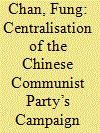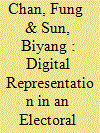| Srl | Item |
| 1 |
ID:
162354


|
|
|
|
|
| Summary/Abstract |
Following the initiation of the policy of ‘Reform and Open Door’, the possibilities for public officials to trade power for private gain in China increased. To tackle the problem of corruption, different levels of Discipline Inspection Commissions (DICs) in the Chinese Communist Party (CCP) initiated investigation related to various corruption cases. However, due to the nature of the administrative set-up in China, the local DICs could not effectively carry out their functions. As a result, the Central Commission for Discipline Inspection (CCDI) was compelled to take on a bigger role, including controlling personnel appointments in local DICs and dispatching inspection teams to local jurisdictions. This strategy also enabled the central government and the top leadership of the CCP to build up a positive image with respect to fighting corruption. Nevertheless, the discretionary power of the top party leaders that has been enhanced through these centralisation measures leads to doubts over the real motives behind the CCP’s anti-corruption efforts. In March 2018, the National Supervision Commission (NSC) was established as the highest governmental anti-corruption agency, but more time is needed to judge the effectiveness of this new institution.
|
|
|
|
|
|
|
|
|
|
|
|
|
|
|
|
| 2 |
ID:
167854


|
|
|
|
|
| Summary/Abstract |
Widely known by the public, the Chief Executive of Hong Kong is selected not by universal suffrage but by a 1,200-member Election Committee (EC). While candidates Carrie Lam, John Tsang, and Kwok-hing Woo all ran in the Chief Executive Election of 2017, only Lam received the blessing of authorities in the Mainland. Though Tsang had led the polls throughout the entire campaign and was popular on several social media platforms, a majority of EC members still cast their vote for Lam as Chief Executive. This was the first time that EC members voted against popular opinion in the Chief Executive Election. This paper analyzes the limited power of social media under elections that are under the influence of Mainland China. It also examines the problem of legitimacy in such electoral settings and the way in which authorities in the Mainland have influenced electoral outcomes through defects in the institutional systems of Hong Kong. The 2017 Chief Executive Election affirmed the tightened control of Mainland authorities over the affairs of Hong Kong.
|
|
|
|
|
|
|
|
|
|
|
|
|
|
|
|
| 3 |
ID:
182574


|
|
|
|
|
| Summary/Abstract |
This study is to analyze how the fragmentation of the pro-democracy camp affected their council voting and policy stances before 2019. The quantitative measurements including the rice and unity indices are adopted to evaluate the cohesions of the pro-Beijing and pro-democracy camps in bill voting, in which the strategies employed by the pro-democracy camp are further analyzed. Before the 2010s, the moderate democrats deliberately separated from the administration and some of them also kept distance from the radical groups. However, since the radical ideologies gained supports from time to time, the moderate democrats had been forced to follow more pro-active lines against the administration. Although the political sphere of Hong Kong has drastically changed after the 2019 Anti-extradition Protests, the cohesion of the pro-democracy parties in the previous terms of the Legislative Council still facilitates to understand the legislative process in the city. In this article, 18 then members of the Legislative Council from different parties were interviewed in 2018, providing various insights on the analysis of pro-democracy cohesion and fragmented politics in Hong Kong.
|
|
|
|
|
|
|
|
|
|
|
|
|
|
|
|